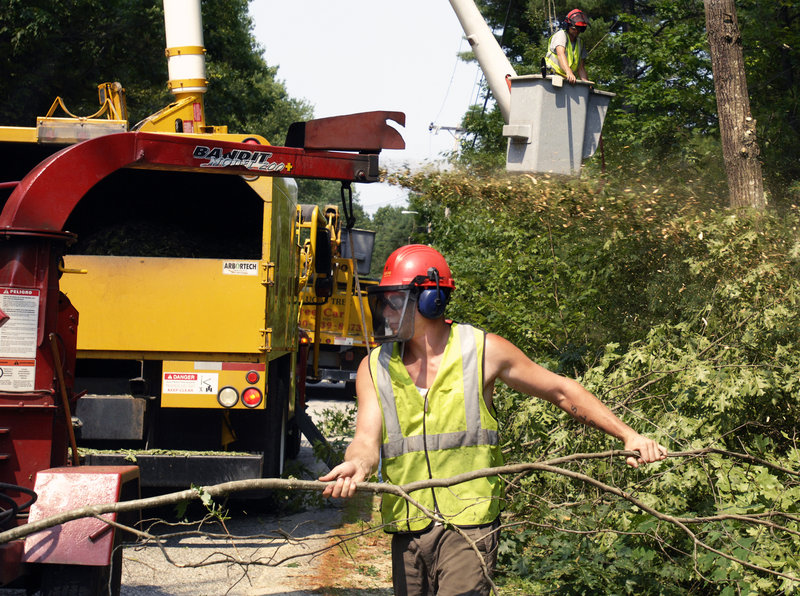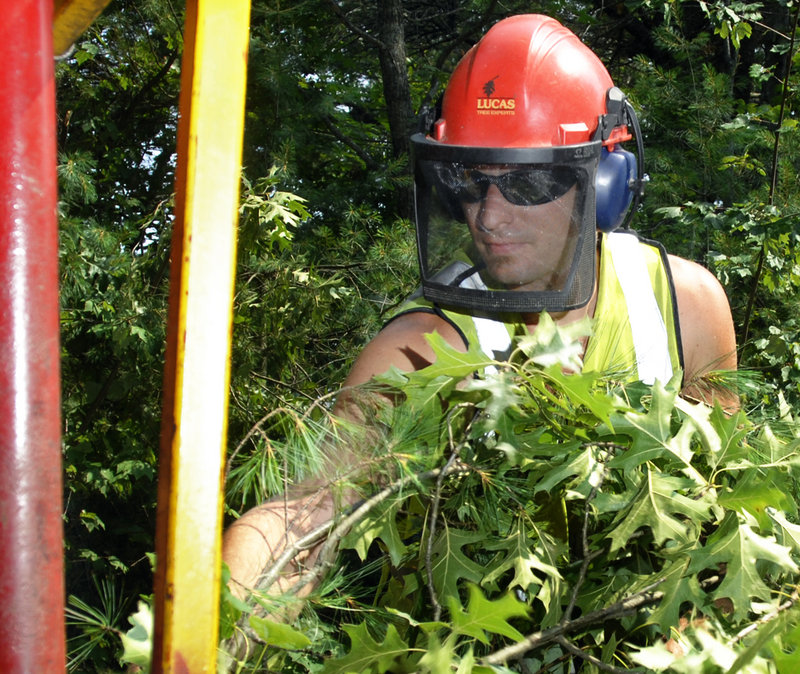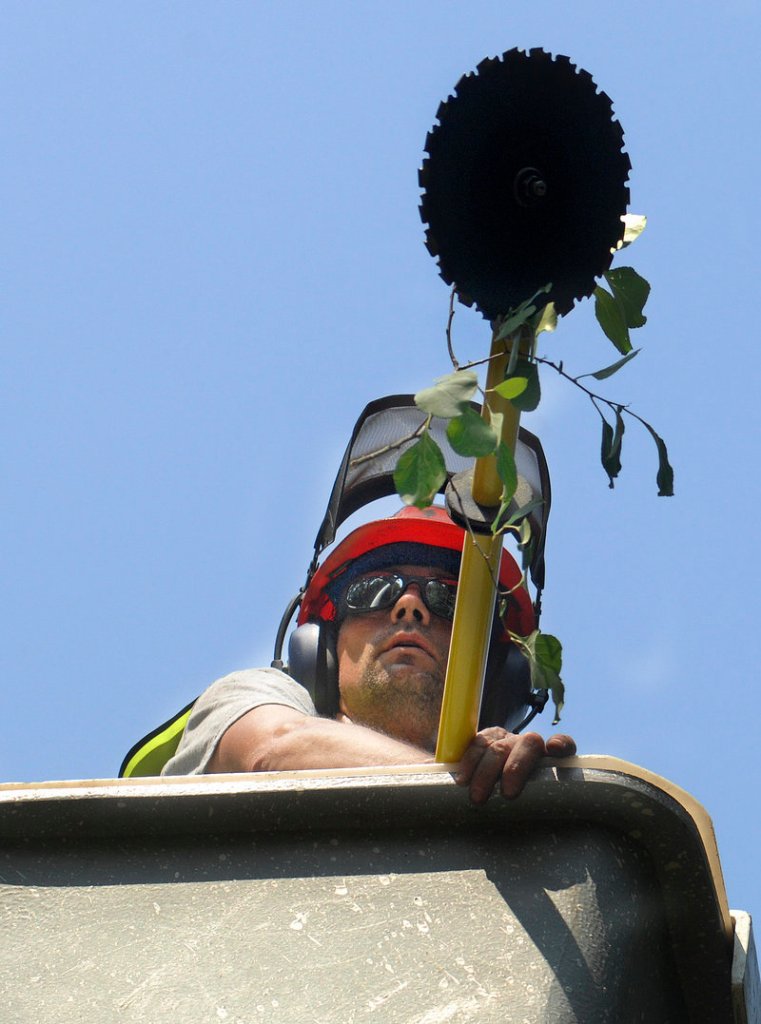WINDHAM – The whine of a circular saw drowned other noise along Pope Road in Windham last week.
It came from a foreman with Lucas Tree Experts, who stood in a bucket 40 feet above his truck, cutting tree limbs near power, telephone and cable lines.
Below, workers gathered fallen branches and stuffed them into a chipper. Others directed traffic.
“These are the meat-and-potato guys. These are the ones that make (the company) go,” said Keith Moxcey, Portland district supervisor for Lucas Tree, standing roadside in a yellow safety vest and hard hat.
Trimming vegetation for utilities is the primary business of Lucas Tree, a Falmouth-based company with $32 million in yearly revenue and double-digit annual growth.
In recent years, Lucas Tree has landed new contracts with utility companies, and expanded north into Canada and down the Eastern seaboard.
But tree-trimming is risky business, and one of the most deadly industries. Executives say Lucas Tree has been successful largely because of a company-wide emphasis on safety.
“Injuries are common. People are working 75 feet in the air and working with highly dangerous equipment. That’s why safety is such a critical component to distinguish ourselves and keep our work force productive,” said Lucas Tree President Arthur Batson Jr.
Lucas Tree has 400 staffers, including roughly 260 in Maine. The company owns 300 road vehicles, like bucket trucks and chipper trucks, and some 400 other pieces of heavy equipment, including mowers, harvesters and tree cutters called feller-bunchers.
The company has a residential tree care division that works in and around Portland and Charleston, S.C. Residential services include trimming trees and bushes, lawn care and mosquito and tick control. They even hang holiday lights.
But 95 percent of revenue comes from utility work: trimming around gas pipelines and utility wires that run roadside and through deep forest. Crews also respond to weather emergencies, clearing lines knocked down by storms.
Lucas Tree’s roots extend to 1926, when John Lucas founded the company in a garage on Munjoy Hill in Portland. When Lucas died in 1931, W.H. Hinman purchased the company.
Under Hinman, Lucas Tree landed new contracts with utilities and, during World War II, laid cables connecting the mainland to military outposts on the Casco Bay islands.
Also working on the project was Army engineer Arthur Batson Sr., who later joined the company and purchased 10 percent of Lucas Tree. He became general manager in the early 1960s.
Batson’s son, Arthur Jr., worked at Lucas Tree in high school and college and joined the company in 1971. In the 1980s, Arthur Jr. bought Hinman’s shares.
Today, Arthur Jr. owns the company with his son, Chief Financial Officer Arthur Batson III, and another partner, Vice President and Chief Operating Officer Peter Marion.
The company is based in Falmouth, but has a maintenance facility on Riverside Street in Portland.
Lucas Tree earned revenue of $32 million in 2010, up from $21 million in 2004, said Batson III. He predicts the company’s 2011 revenue will hit $36 million.
Executives said the recession had a limited impact on the business because electricity remained in demand and skilled labor was readily available.
In recent years, Lucas Tree expanded down the coast as far as South Carolina, and now operates in 10 states. They also have a presence in six Canadian provinces, from Newfoundland -and Labrador to Alberta.
The company has few facilities outside the Portland area. Independent service stations maintain distant trucks, and the fleet has on-board tracking and GPS systems for navigation and communication with the home office.
Batson Jr. said the expansion was a response to consolidation in the utility industry, which began 10 or 15 years ago. Many formerly independent clients were now part of a single corporation, making Lucas Tree reliant on fewer customers.
For example, Halifax-based Emera Inc. owns Bangor Hydro Electric and Nova Scotia Power. And the U.S. division of Iberdrola, which is based in Spain, owns Central Maine Power.
“In order not to have all your eggs in one basket, we have had to expand geographically to build up a more diversified customer base,” Batson Jr. said.
The tree care industry has been buoyed in recent years by new federal rules imposing fines on electric utilities that don’t follow line maintenance plans.
The regulations followed the August 2003 blackout in the Northeast, which was caused by a fallen tree limb and left 50 million people in the Northeast and Canada without power.
In response, power companies often chose to cut trees within 10 feet of lines, rather than prune them, said Mark Garvin, president and CEO of Londonderry, N.H.-based trade group Tree Care Industry Association.
States are also increasing oversight. In 2009, for instance, the Maine Public Utilities Commission mandated that Central Maine Power trim vegetation around every power line every five years, said Batson III.
Some executives think government regulation can also help improve the safety record of their industry, which is one of the nation’s most dangerous.
Tree care industry executives, including Batson Jr., are meeting with lawmakers next week in Washington, D.C., to press for new federal safety standards.
Garvin said an average of two tree care workers die every week on the job. There are about 200,000 tree care workers nationwide. Electrocution, falling from heights and being struck by falling branches are top hazards.
Accidents raise workers’ compensation insurance rates and make recruiting new employees more difficult, Garvin said.
Lucas Tree and other leading companies have good training and safety programs, and pay for employees to take certification classes, said Garvin.
Lucas Tree is one of the first in the industry to receive SHARP status under the federal government’s Safety and Health Achievement Recognition Program, said Batson III. The program recognizes small businesses that “operate an exemplary safety and health management system,” according to the U.S. Department of Labor’s website.
But not all companies invest heavily in safety, and those that don’t can undercut others on price, Garvin said.
“If you have some guy that sends day laborers out with no hard hat and no safety training, it’s very difficult to compete,” he said. “Training and safety is not free.”
But it’s a good investment for Lucas Tree, he said.
“Lucas wants to make arboriculture a career, which means training and safety,” he said. “It’s probably one of the reasons they are being successful.”
Jonathan Hemmerdinger can be reached at 791-6316 or:
jhemmerdinger@mainetoday.com
Copy the Story Link
Send questions/comments to the editors.





Success. Please wait for the page to reload. If the page does not reload within 5 seconds, please refresh the page.
Enter your email and password to access comments.
Hi, to comment on stories you must . This profile is in addition to your subscription and website login.
Already have a commenting profile? .
Invalid username/password.
Please check your email to confirm and complete your registration.
Only subscribers are eligible to post comments. Please subscribe or login first for digital access. Here’s why.
Use the form below to reset your password. When you've submitted your account email, we will send an email with a reset code.